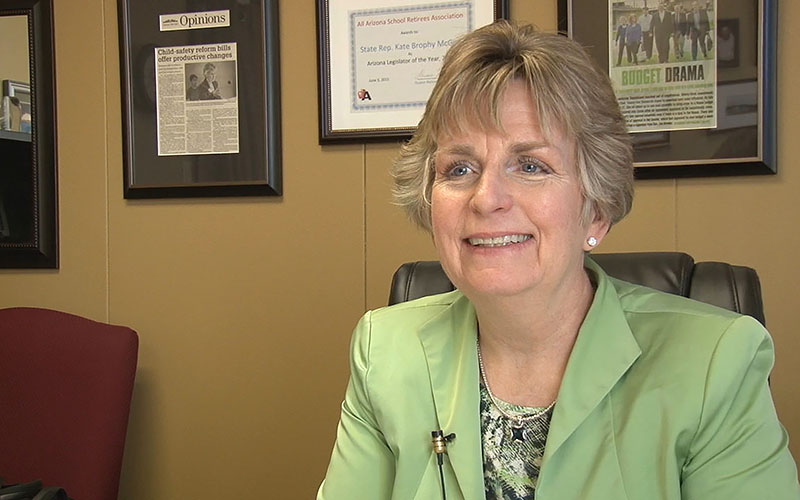
Rep. Kate Brophy McGee is attempting to raise awareness on multiple sclerosis in the Arizona Legislature and public. (Blake Benard/Cronkite News)
YUMA – Every three months, Mary Schaal makes the nearly 400-mile round trip from her home in Yuma to Gilbert on the southeastern edge of Phoenix.
Schaal, diagnosed with multiple sclerosis four years ago, counts herself lucky.
“I’m really blessed. I can go to an MS specialist,” Mary said.
Thousands of people living with multiple sclerosis in rural Arizona lack easy access to health care, according to advocates. Those with the degenerative motor-neuron disease in communities like Payson, Yuma, and Flagstaff must travel hundreds of miles to the Phoenix metro area to seek treatment from specialists to help fight the disease.
The national MS Society estimates about 3,500 people with the disease live in rural areas.
“Multiple sclerosis can affect seeing. It can affect swallowing, walking, talking, cognition, feeling, like the numbness that I mentioned, balance. All kinds of things,” Schaal said.
Schaal was diagnosed just before her 40th birthday. She couldn’t walk. She couldn’t feel her arms.
After dozens of trips to Gilbert to her MS specialist, she learned to walk again.
Many members of Schaal’s support group aren’t as fortunate. Her husband drives her to Gilbert for her medical appointments.
“It’s an access issue and I think we see that in all types of communities, not just the MS communities. Access to care is higher quality and more readily available in urban communities like Phoenix,” said Erika Edholm, a director with the Arizona chapter of the National MS Society.
If patients can’t make a trip to the Phoenix area, they have to rely upon local neurologists. Patients may have to wait several months.
But solutions are on the horizon. The Arizona Legislature is taking up the cause of those struggling with MS in rural areas.
“We’re doing everything we can to raise the profile of the disease and educate the public on what exactly it is. That’s the first step: raising awareness,” said Rep. Kate Brophy McGee, A Republican representing District 11 near Marana and Oro Valley outside Tucson.
Brophy McGee said using technology to connect patients and doctors is one way to cut down on transportation costs and time.
“Telemedicine. That means with technology we can actually put the patient who is many many miles away in front of a doctor who is the expert or the treatment experts via television,” Brophy McGee said.
Schaal suggests MS specialists could travel to rural areas for a couple days every month so they could see several patients. Even sending a nurse practitioner with expertise in MS could be a huge help to people living in cities like Yuma, Flagstaff, or Payson.